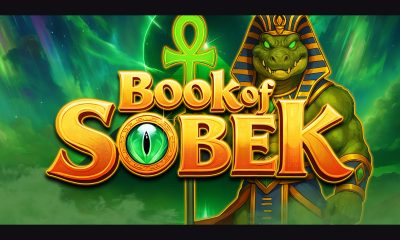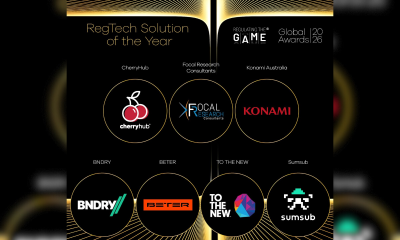Uncategorized
Exclusive Interview: Jonathan Power, Founder and MD of Voxbet
European Gaming talks to Jonathan Power, Founder and MD of Voxbet, about the company’s rise to prominence in the sports betting space and making waves in genuine innovation with its latest betting microphone for sportsbooks.
What was your industry background before you started Voxbet as Onionsack in 2006?
My background was in fintech. My co-founders and I had a background in modernising banking tech for the big UK and Irish banks in the 1990s. We did that until the mid-2000s, and I was always very keen to have my own gig. I wanted to enable something that would enable people to conduct value transactions by text message. This was before the smartphone, but we built a platform that could prove it was you who sent the message. We came up with a number of applications for that technology, but the target was fintech and person-to-person payments.
What I knew from my experience with fintech was that the banks won’t touch anything that hasn’t been proven in another industry. We did a few things. We had person-to-person payments, share trading, we offered the buying of concert tickets, but we chose sports betting. You could make a bet by writing what you would write on a betting slip and sending it in a text message. We would read the text message and know who you are. If it was a high-value transaction, we would prove it was you that sent it by calling you back and taking a print of your voice.
I took a punt that the betting industry would try something like that. I went to a trade show in November, and we went live with the Tote in the UK the following June. It was a time when you could get things done. I never left the industry, and even though I say I’m from a fintech background, I’m actually more from a sports betting background now, in terms of years served.
Did yourself and your partners know much about the sports betting space going into it?
I did as a punter, but I didn’t know who to talk to. I took a stand at a trade show and we did well out of it. From there, we did deals with William Hill and Paddy Power, so we built a nice little business out of that. Smartphones then made text betting quite niche quite quickly, but people who bet with us via text in 2006 still do that with us now. We made a massive pivot (in branding terms, more so than technologically) to move into voice betting about a year-and-a-half ago, and we’ve been Voxbet ever since.
With text betting, what would a supplier offer as opposed to an operator saying “text us on this number”?
We would have read the message and understood it. Everybody is uniquely identifiable by their phone number, so we would know it was you, we would know you had the device in your hand, and what it is you wanted. There was about an 80% chance we could read the message and place the bet automatically, before sending you back confirmation, and there was about a 20% chance we wouldn’t understand it with 100% certainty; in which case we needed a call centre agent to bring some human intelligence to the interaction. That’s the platform which is up and running and it’s still used in a number of places, but it’s not what we’re presenting to everyone now. Everything now is all about voice.
When it came to the voice tech, what did your research tell you about what was missing in that space and were many other suppliers offering it at the time?
There were two things we noticed. The first is that tens of billions of dollars are being spent on voice by big tech companies. Google, Microsoft, Apple, Amazon and IBM all have massive products in the voice space and have spent tens of billions acquiring companies in that space. They have made a huge bet on the future of interacting digitally being voice.
The other factor is an awareness that there’s so much content on the sports betting side now. When sports betting sites first went online, it was more or less taking the shop coupon and putting it on a web page; it was that simple. When Google launched in 1997, there were two million websites in the world; there are now two billion. One sports betting site now offers more than two million things you can bet on, but there was still a way of navigating things before Google entered the scene, where you would go through layers and layers of menus. That’s a poor user experience and it’s not an experience for people other than existing gamblers who have had no choice but to use that system. Young people won’t use it like that. If Spotify was laid out the way a sports betting site is laid out, nobody would use it; it would be unusable. People are used to getting what they want everywhere else online.
This wasn’t something sports betting suppliers had tried before, and it actually turned out to be much more difficult than we expected. We thought we could plug into the existing engines like Google and IBM. They work really well to about 90%, but then they apply artificial intelligence which can change what a customer is saying to something that they didn’t say. Sporting parlance is quite unique. If I said to Google that I wanted a £20 treble on Liverpool, Leeds and Coventry, it will say you want £20 travel to those places! That’s actually a benign example and there are some brand-damaging examples. It’s not the sort of thing you could launch with the kind of mistakes those engines can make, so we’ve had to adapt to that and come up with something specific to sport.
How did you go about creating the technology that could iron out those issues you mention?
We knew an awful lot about sports betting language from our text betting days. We started out on the assumption that if you could understand a bet which is expressed in words, you could understand a spoken bet. But as I say, it did turn out to be more of a challenge than we thought it would be.
The way we have fixed that problem is by creating a dictionary where the only thing that dictionary understands is sporting terms, and we recompile that dictionary every hour, based on which events are on. We’re working on the assumption you won’t bet on something today that starts in a week’s time, and the universe of what you’re trying to understand becomes too complex if you look too far ahead. I’d say 99% of our traffic is for events happening soon. If it’s not accessible by voice, it’s still accessible the old way. You can make the problem much smaller if you say people are betting in this space right now, and then you recompile the language to be relevant to sports betting in this moment. If you keep recompiling it, it will then be phenomenally fast and accurate.
Does this work just as well then if I want to bet on a complex Betbuilder as much as a single match?
It’s working on racing at the moment, and it will do anything up to the most complicated place bot in one hit. You can say ‘£5, place bot,’ and call out all your horses. The target is to eventually include Betbuilders. Once we can do that on horse racing, we will know we can do it on other sports as well.
So how many sports can it work for right now and what sports are you planning to expand to?
In English, the rollout will be in three phases. The first is for horse racing, which is ready to go. The second is for football, which we’re working on, and the third phase is everything else.
How significant could this be for operators, in terms of the percentage of bets that could be placed this way?
That’s something we will begin to understand after we launch. We’re working on an integration in Asia, and in the UK, it will launch before Cheltenham. We don’t know yet, but what we do know from our text betting metrics is that the people who want the easiest way of betting are the people who bet a lot. The average user of a betting app might bet 12-15 times per month. The average user of text betting in France for example bets 160 times per month. Simplicity appeals to those who interact a lot with sportsbooks, and they’re very important customers who are currently poorly served by having to do a lot of digging.
Are you particularly looking at younger demographics within the serious bettor demographic?
We’re after two key demographics. The first is more important in value terms rather than volume terms, so for those who know what they want, we want to give them an easier journey. The second cohort is younger people who engage digitally with their voice every day already. They use interfaces like Spotify and TikTok, and have never had to navigate something like a sportsbook, so that’s a key market for us as well.
Would I need to be logged into the app to use the voice technology?
The intention with our bet mic is that you’re inside the app. We give operators a widget that they can put on their homepage. You press and hold the microphone, say what you want and let go. That then brings you to the betslip.
How compatible would that be then with something like Alexa?
Alexa won’t work for this. It was something we looked into. We did demos on it and it looked impressive when it worked, but the problem at the moment is that Amazon will translate what a customer said to Alexa, and it just gives you the transcript. Amazon has to do that without any context of what you said, so it’s actually phenomenally impressive that it comes even close, but most of the time, it doesn’t come close enough. You can get it to work, but it doesn’t work at a high enough level of accuracy. At the moment, I would say ours will work 99% of the time and produce exactly what you said. It becomes much simpler when you have context, but that means you can’t use tools like Siri and Alexa, because they work without context.
How challenging will it be to get across to people that this is a different way to bet from what people are used to? How will you change people’s mindset and make this the first thing they think to do with a betting app?
People of my age learn from younger people. I see my children do something and then I start doing it. It’s partially going to be down to operators to get it across to their customers that there’s an easier way of doing things. When you see a microphone, you tend to know what it’s for. If you see a microphone on the homepage of a sportsbook, you will wonder if you can just speak your bet.
The likes of Waterhouse VC have invested in your business. What has that investment been used for specifically and are you still looking for further investment?
Industry heavyweights open doors and their evangelism is transformative to us as a company, because people really listen to them. We use the word ‘ubiquity’ 10 times a day, and that’s our target. We know that when the right innovation hits the industry, everybody wants it. That’s what happened with in-play betting, cashout and in-game multiples, and we think this is in the same category. Those investors can change this from being a niche product which a few people think is cool to something that will become ubiquitous. We’re not looking for further investment. We have a trading business with our text betting, and that’s something we will look at, but not right now.
What is their equity in the business?
A lot of deals like that these days are structured with underlying options. They’ve bought a small piece but they’ve got an option for a bigger piece. I’d advise any innovator to look at offering industry evangelists deals that are structured like that, because it means they’re not penalised for the value they create. They can buy more at the same value as when they joined the business, even when it’s worth significantly more. All of them have put their own money in.
Does their collective ownership come to around 10% or less than that?
I’d say collectively it’s around 10%, but they have options to go nearer to 20-25%.
What do you think really needs to improve in the area of voice technology and how will you take it on a level?
I think the big tech in this space is amazing and I wouldn’t want to be seen to be in any way critical of it, but they’re working without any context. If you use Google’s voice dictation, it’s phenomenally accurate, but it is having to do that without context. You’ve got so many things happening in a sportsbook, and even if you want to ask about events in the next three hours, it’s too much to ask Google to understand that model, because there’s too many terms.
I think the big tech engines aren’t sufficiently adaptable to customer-facing scenarios in a B2B sense, but the business knows the context. I could be at an insurance company, and I know when someone sends me a voicenote over WhatsApp, they’re going to be talking about making a claim or wanting a renewal. The amount of language that’s relevant in that scenario is a very small fraction of what they’re able to understand, but because they’re open to understanding everything, they get more wrong. I think the ability to configure their platforms for a very narrow context is what makes us different.
How many operators have you partnered with and how many will you go live with at Cheltenham?
We have one media company which we will go live with, and they work with 10 UK bookmakers, so there will be bets placed with this at up to 10 major UK bookmakers.
Going forward, which markets will you focus on?
English is a priority. Everybody wants to focus on the US, but for us, we are also focusing on the Chinese language. We’ve got our platform working for the Asian market, so if we can do that, we can do anything. English will be the priority, but our biggest customer is PMU in French, which is easy for us to do. We’re undecided but we will take the opportunities where they come. A new language requirement will take about a month for us to get it working.
Do you have a target for the number of sites you want to be live with in the next few years?
We want to be live on at least 100 sites in three years and want to be on almost every site within five years.
How will the technology evolve over the next few years to allow that to happen?
The voice technology that’s out there is good enough. It will really depend on whether operators want to offer a chat-style user interface, where a customer can say: ‘I want to bet and I fancy Liverpool to beat Spurs tonight. What will the price be if put 20 quid on that?’ That’s not our approach. We just want customers to say: ‘£20, Liverpool to win.’
The whole area of what’s happening with ChatGPT and AI could change what user experiences people want and how they want to engage. I think people want to engage with technology as though it’s technology and want to engage with people naturally. It would be sad if people wanted to engage with technology as though it’s a person, but that doesn’t mean it won’t happen.
Powered by WPeMatico
Uncategorized
GoldenRace launches Goal2Win to bridge the gap between football and numbers

Reading Time: 2 minutes
The world of sports betting and gaming is set for a major shake-up with the launch of GoldenRace’s innovative, new number game, Goal2Win, designed to captivate the massive global football audience. Goal2Win successfully bridges the gap between the universal passion for the “king of sports” and the proven thrill of number-based predictions, offering partners a fresh, high-potential product for monetisation.
Goal2Win is a premium offering that takes the familiar, classic number game format and integrates it with a dynamic, football-centric theme. This unique combination makes the game instantly recognisable yet excitingly new, appealing both to seasoned sports bettors and newcomers seeking an engaging, simplified experience.
Goal2Win is GoldenRace’s proposal to mix innovation and tradition. It offers operators a product that leverages the immense reach of football fandom while delivering the straightforward, engaging gameplay and massive win potential expected from a top-tier number game. It’s a compelling blend of excitement, simplicity, and significant reward potential.
Key features driving engagement and potential winnings:
Goal2Win is engineered for maximum player retention and high stakes, boasting dynamic gameplay and powerful features:
- Multiplier feature: Players can place the same set of bets across an impressive twenty-two consecutive events, significantly driving up potential winnings and ensuring sustained engagement over time.
- Jackpots and Mega Jackpots: The game includes tiered winnings with both standard Jackpots and highly coveted Mega Jackpots, promising life-changing sums and acting as a powerful player motivator.
- Quick picks: For rapid access to the action, the Quick picks option allows the system to randomly select numbers, streamlining the betting process for players.
- Row/Column selector: Enhancing the user experience, selector buttons enable players to easily pick an entire row or column of numbers, simplifying sophisticated betting.
Goal2Win represents a unique opportunity for operators to tap into the immense global football fanbase with a product that is both innovative and instantly recognisable. It stands poised to become a staple offering, driving higher stakes and attracting a broader demographic to the operators’ portfolio.
The post GoldenRace launches Goal2Win to bridge the gap between football and numbers appeared first on European Gaming Industry News.
Uncategorized
PayAdmit partners with Yaspa to integrate Pay by Bank on its payments platform

Reading Time: < 1 minute
Yaspa, the Pay by Bank fintech, today announced a partnership with PayAdmit, the London-based payment software provider and orchestrator used by merchants across eCommerce, iGaming and digital services. The integration brings Pay by Bank to PayAdmit’s platform, giving its merchants a faster, secure, cost-effective way to accept customer payments with real-time confirmation.
PayAdmit offers a modular payments stack that includes White Label, Cashier Service, Payment Bridge and Payment Concierge Service — a high-touch support layer for resolving payment issues in real time. The platform aggregates 350+ global payment methods and provides streamlined onboarding, enabling merchants to go live in as little as 14 days.
Adding Yaspa gives PayAdmit’s clients a high-conversion bank payment option built for speed, conversion and compliance.
Yaspa’s Head of Commercial, Amie Kadhim, said: “PayAdmit moves fast and sets a high bar on payment performance, reliability and checkout experience. We’re excited to power their next chapter with instant bank payments that are speedy, secure and deliver a smooth, mobile-first experience – boosting approval rates and settling funds immediately.”
For PayAdmit’s merchants, the integration with Yaspa delivers:
- Real-time deposit confirmation
- Lower processing costs versus traditional methods i.e. debit and credit cards
- Reduced fraud and chargeback risk with bank-level authentication
- A smoother mobile journey with no card details to key in
Yaspa’s benefits align with PayAdmit’s focus on performance, security and a modern, merchant-friendly toolkit.
Vladyslav Kolodistyi, CEO of PayAdmit added: “Our mission is to give merchants a flexible, future-proof payments stack. Partnering with Yaspa adds a best-in-class, instant bank payment option, so clients get higher conversion with less complexity.”
The post PayAdmit partners with Yaspa to integrate Pay by Bank on its payments platform appeared first on European Gaming Industry News.
Uncategorized
Continent 8 appoints Julia Weygandt as Head of Client Growth & New Business

Reading Time: < 1 minute
Continent 8 Technologies, a leading provider of cutting-edge managed IT solutions designed for the global iGaming and online sports betting industry, announces the appointment of Julia Weygandt as Head of Client Growth & New Business.
Based in Malta, Julia will spearhead strategic initiatives to drive customer growth and capture new market opportunities globally, working closely with the existing Sales team and Practice Leads.
Julia brings over 20 years of experience in gaming, entertainment, and technology, with a proven track record in commercial strategy, international market expansion, and strategic partnerships. Her career includes senior roles such as COO at G Games and Tornado Games, and Head of International Partnerships at GAMOMAT, where she successfully scaled operations and delivered significant revenue growth.
Julia is an active advocate for diversity and leadership in gaming, serving as a Board member for Global Gaming Women and leading partnerships for the Behind the Gloves initiative, which combines boxing and corporate engagement to support charitable causes.
Nick Nally, Chief Revenue Officer at Continent 8 Technologies, commented: “Julia’s appointment reflects our commitment to delivering exceptional value and growth opportunities for our customers. Her deep industry knowledge, commercial acumen, and passion for building strong partnerships make her an outstanding addition to our team. We are excited to see the impact she will have as we continue to expand globally.”
Julia Weygandt, Head of Client Growth & New Business, added: “I’ve known the Continent 8 team for a long time; they are a trusted and respected partner to the world’s leading iGaming operators and suppliers, and I am thrilled to join at such an exciting time. My focus will be on driving client success through innovative solutions and strategic growth initiatives, ensuring we continue to lead in this fast-evolving industry.”
The post Continent 8 appoints Julia Weygandt as Head of Client Growth & New Business appeared first on European Gaming Industry News.
-

 Africa6 days ago
Africa6 days agoDive Into a Different Kind of Love This February with Springbok Casino’s ‘Whalentines Month’ and Claim 25 Free Spins
-

 Book of Sobek6 days ago
Book of Sobek6 days agoHölle Games Releases Book of Sobek
-

 Danske Spil6 days ago
Danske Spil6 days agoS Gaming lands in Denmark with Danske Spil
-

 ACMA6 days ago
ACMA6 days agoACMA: Six Wagering Providers Breach Gambling Self-Exclusion Rules
-

 Australia6 days ago
Australia6 days agoFinalists Announced for Inaugural Regulating the Game Global Awards Following Strong Global Engagement
-

 Latest News6 days ago
Latest News6 days agoThunderkick Unveils Pan’s Arcadia, a Utopian Wilderness
-

 Latest News5 days ago
Latest News5 days agoBMM TESTLABS GRANTED NEW LICENSE IN BRAZILIAN STATE OF MINAS GERAIS, EXPANDING ITS PRODUCT TESTING AND CERTIFICATION FOOTPRINT IN BRAZIL
-

 Alex Baliukonis Game Producer at BGaming6 days ago
Alex Baliukonis Game Producer at BGaming6 days agoExperience Olympic Excitement in BGaming’s Winter Trophy Hold & Win



















